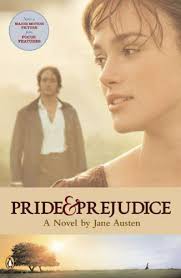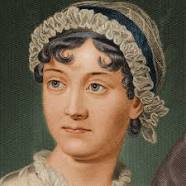Pride and Prejudice Page #17
Pride and Prejudice is a romantic novel by Jane Austen, first published in 1813. The story charts the emotional development of the protagonist, Elizabeth Bennet, who learns the error of making hasty judgments and comes to appreciate the difference between the superficial and the essential. The comedy of the writing lies in the depiction of manners, education, marriage, and money during the British Regency period.
“Has she been presented? I do not remember her name among the ladies at court.” “Her indifferent state of health unhappily prevents her being in town; and by that means, as I told Lady Catherine one day, has deprived the British court of its brightest ornament. Her ladyship seemed pleased with the idea; and you may imagine that I am happy on every occasion to offer those little delicate compliments which are always acceptable to ladies. I have more than once observed to Lady Catherine, that her charming daughter seemed born to be a duchess, and that the most elevated rank, instead of giving her consequence, would be adorned by her. These are the kind of little things which please her ladyship, and it is a sort of attention which I conceive myself peculiarly bound to pay.” “You judge very properly,” said Mr. Bennet, “and it is happy for you that you possess the talent of flattering with delicacy. May I ask whether these pleasing attentions proceed from the impulse of the moment, or are the result of previous study?” “They arise chiefly from what is passing at the time, and though I sometimes amuse myself with suggesting and arranging such little elegant compliments as may be adapted to ordinary occasions, I always wish to give them as unstudied an air as possible.” Mr. Bennet's expectations were fully answered. His cousin was as absurd as he had hoped, and he listened to him with the keenest enjoyment, maintaining at the same time the most resolute composure of countenance, and, except in an occasional glance at Elizabeth, requiring no partner in his pleasure. By tea-time, however, the dose had been enough, and Mr. Bennet was glad to take his guest into the drawing-room again, and, when tea was over, glad to invite him to read aloud to the ladies. Mr. Collins readily assented, and a book was produced; but, on beholding it (for everything announced it to be from a circulating library), he started back, and begging pardon, protested that he never read novels. Kitty stared at him, and Lydia exclaimed. Other books were produced, and after some deliberation he chose Fordyce's Sermons. Lydia gaped as he opened the volume, and before he had, with very monotonous solemnity, read three pages, she interrupted him with: “Do you know, mamma, that my uncle Phillips talks of turning away Richard; and if he does, Colonel Forster will hire him. My aunt told me so herself on Saturday. I shall walk to Meryton to-morrow to hear more about it, and to ask when Mr. Denny comes back from town.” Lydia was bid by her two eldest sisters to hold her tongue; but Mr. Collins, much offended, laid aside his book, and said: “I have often observed how little young ladies are interested by books of a serious stamp, though written solely for their benefit. It amazes me, I confess; for, certainly, there can be nothing so advantageous to them as instruction. But I will no longer importune my young cousin.” Then turning to Mr. Bennet, he offered himself as his antagonist at backgammon. Mr. Bennet accepted the challenge, observing that he acted very wisely in leaving the girls to their own trifling amusements. Mrs. Bennet and her daughters apologised most civilly for Lydia's interruption, and promised that it should not occur again, if he would resume his book; but Mr. Collins, after assuring them that he bore his young cousin no ill-will, and should never resent her behaviour as any affront, seated himself at another table with Mr. Bennet, and prepared for backgammon. Chapter 15 Mr. Collins was not a sensible man, and the deficiency of nature had been but little assisted by education or society; the greatest part of his life having been spent under the guidance of an illiterate and miserly father; and though he belonged to one of the universities, he had merely kept the necessary terms, without forming at it any useful acquaintance. The subjection in which his father had brought him up had given him originally great humility of manner; but it was now a good deal counteracted by the self-conceit of a weak head, living in retirement, and the consequential feelings of early and unexpected prosperity. A fortunate chance had recommended him to Lady Catherine de Bourgh when the living of Hunsford was vacant; and the respect which he felt for her high rank, and his veneration for her as his patroness, mingling with a very good opinion of himself, of his authority as a clergyman, and his right as a rector, made him altogether a mixture of pride and obsequiousness, self-importance and humility. Having now a good house and a very sufficient income, he intended to marry; and in seeking a reconciliation with the Longbourn family he had a wife in view, as he meant to choose one of the daughters, if he found them as handsome and amiable as they were represented by common report. This was his plan of amends--of atonement--for inheriting their father's estate; and he thought it an excellent one, full of eligibility and suitableness, and excessively generous and disinterested on his own part. His plan did not vary on seeing them. Miss Bennet's lovely face confirmed his views, and established all his strictest notions of what was due to seniority; and for the first evening she was his settled choice. The next morning, however, made an alteration; for in a quarter of an hour's tete-a-tete with Mrs. Bennet before breakfast, a conversation beginning with his parsonage-house, and leading naturally to the avowal of his hopes, that a mistress might be found for it at Longbourn, produced from her, amid very complaisant smiles and general encouragement, a caution against the very Jane he had fixed on. “As to her younger daughters, she could not take upon her to say--she could not positively answer--but she did not know of any prepossession; her eldest daughter, she must just mention--she felt it incumbent on her to hint, was likely to be very soon engaged.” Mr. Collins had only to change from Jane to Elizabeth--and it was soon done--done while Mrs. Bennet was stirring the fire. Elizabeth, equally next to Jane in birth and beauty, succeeded her of course. Mrs. Bennet treasured up the hint, and trusted that she might soon have two daughters married; and the man whom she could not bear to speak of the day before was now high in her good graces. Lydia's intention of walking to Meryton was not forgotten; every sister except Mary agreed to go with her; and Mr. Collins was to attend them, at the request of Mr. Bennet, who was most anxious to get rid of him, and have his library to himself; for thither Mr. Collins had followed him after breakfast; and there he would continue, nominally engaged with one of the largest folios in the collection, but really talking to Mr. Bennet, with little cessation, of his house and garden at Hunsford. Such doings discomposed Mr. Bennet exceedingly. In his library he had been always sure of leisure and tranquillity; and though prepared, as he told Elizabeth, to meet with folly and conceit in every other room of the house, he was used to be free from them there; his civility, therefore, was most prompt in inviting Mr. Collins to join his daughters in their walk; and Mr. Collins, being in fact much better fitted for a walker than a reader, was extremely pleased to close his large book, and go.
Translation
Translate and read this book in other languages:
Select another language:
- - Select -
- 简体中文 (Chinese - Simplified)
- 繁體中文 (Chinese - Traditional)
- Español (Spanish)
- Esperanto (Esperanto)
- 日本語 (Japanese)
- Português (Portuguese)
- Deutsch (German)
- العربية (Arabic)
- Français (French)
- Русский (Russian)
- ಕನ್ನಡ (Kannada)
- 한국어 (Korean)
- עברית (Hebrew)
- Gaeilge (Irish)
- Українська (Ukrainian)
- اردو (Urdu)
- Magyar (Hungarian)
- मानक हिन्दी (Hindi)
- Indonesia (Indonesian)
- Italiano (Italian)
- தமிழ் (Tamil)
- Türkçe (Turkish)
- తెలుగు (Telugu)
- ภาษาไทย (Thai)
- Tiếng Việt (Vietnamese)
- Čeština (Czech)
- Polski (Polish)
- Bahasa Indonesia (Indonesian)
- Românește (Romanian)
- Nederlands (Dutch)
- Ελληνικά (Greek)
- Latinum (Latin)
- Svenska (Swedish)
- Dansk (Danish)
- Suomi (Finnish)
- فارسی (Persian)
- ייִדיש (Yiddish)
- հայերեն (Armenian)
- Norsk (Norwegian)
- English (English)
Citation
Use the citation below to add this book to your bibliography:
Style:MLAChicagoAPA
"Pride and Prejudice Books." Literature.com. STANDS4 LLC, 2025. Web. 10 Jan. 2025. <https://www.literature.com/book/pride_and_prejudice_9>.




Discuss this Pride and Prejudice book with the community:
Report Comment
We're doing our best to make sure our content is useful, accurate and safe.
If by any chance you spot an inappropriate comment while navigating through our website please use this form to let us know, and we'll take care of it shortly.
Attachment
You need to be logged in to favorite.
Log In